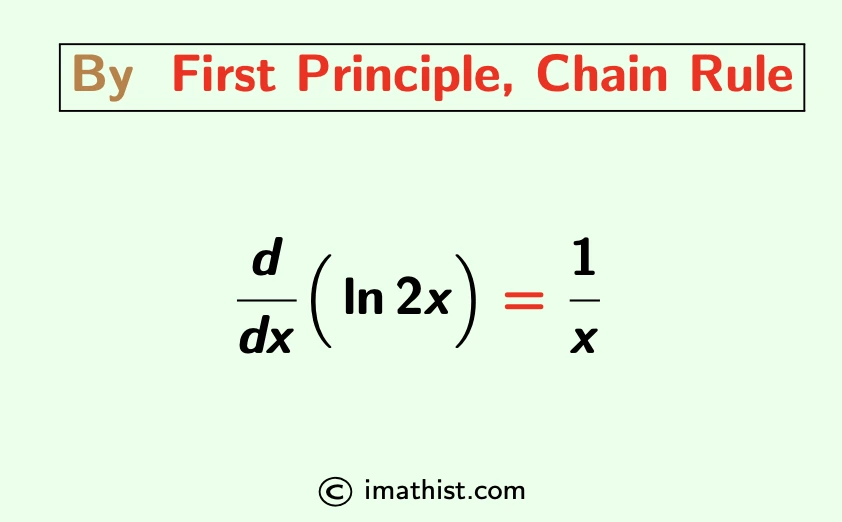The derivative of ln2x is 1/x, where ln denotes the natural logarithm. Here, the ln2x derivative is computed using the first principle and the chain rule of derivatives.
Note that the derivative of ln2x is denoted by d/dx(ln2x), and its formula is given as follows:
$\dfrac{d}{dx}(\ln 2x)=\dfrac{1}{x}.$
That is, the differentiation of ln2x is given by d/dx(ln2x) = 1/x.

Let us now find the derivative of ln 2x.
ln2x Derivative
Question: How to find the derivative of ln2x?
Answer:
To find ln2x derivative, we will use the following three rules:
- ln(ab) = lna + lnb
- $\dfrac{d}{dx}$(constant) = 0
- $\dfrac{d}{dx}$(lnx) = 1/x.
By the above rules, the derivative of ln2x is given by
$\dfrac{d}{dx}$ (ln 2x) = $\dfrac{d}{dx}$(ln2 + lnx)
= $\dfrac{d}{dx}(\ln 2) + \dfrac{d}{dx}(\ln x)$, by the addition rule of derivatives
= $0 +\dfrac{1}{x}$ as ln2 is a constant
= $\dfrac{1}{x}$.
So the derivative of ln2x is equal to 1/x.
Read Also: Derivative of ln3x | Derivative of 1/lnx
Derivative of ln2x by First Principle
| The derivative of a function f(x) by first principle is given by the limit formula $\dfrac{d}{dx}(f(x))$ = limh→0 $\dfrac{f(x+h)-f(x)}{h}$. |
Put f(x) = ln2x.
So the derivative of ln2x by the limit definition is
= limh→0 $\dfrac{\ln 2(x+h)-\ln 2x}{h}$
= limh→0 $\dfrac{\ln \Big(\dfrac{2x+2h}{2x} \Big)}{h}$, using the quotient rule of logarithms.
= limh→0 $\dfrac{\ln \Big(1+\dfrac{h}{x} \Big)}{h}$
| Let h/x = t, so that t→0 when h→0. Also, h=tx. |
= limt→0 $\dfrac{\ln \big(1+t \big)}{tx}$
= $\dfrac{1}{x}$ limt→0 $\dfrac{\ln \big(1+t \big)}{t}$
= $\dfrac{1}{x} \times 1$, at the limit of ln(1+x)/x is 1 when x→0.
= 1/x.
So the derivative of ln2x is equal to 1/x, and this is obtained by the first principle of derivatives.
Related Topic: Derivative of natural log of x
Derivative of ln2x by Chain Rule
Applying the chain rule using z=2x (so that dz/dx =2), we have that
$\dfrac{d}{dx}(\ln 2x)$
= $\dfrac{d}{dz}(\ln z) \times \dfrac{dz}{dx}$
= $\dfrac{1}{z} \times 2$
= $\dfrac{2}{2x}$ as z=2x.
= 1/x.
So the derivative of ln2x by the chain rule is equal to 1/x.
Also Read: Derivative of ln(1+x)
FAQs
Q1: What is the derivative of ln2x?
Answer: The derivative of the natural logarithm of a function f(x) is equal to f'(x)/f(x). So the derivative of ln2x is equal to (2x)’/2x = 2/2x = 1/x.
Q2: If y=ln2x, then find dy/dx.
Answer: If y=ln2x, then dy/dx =1/x.